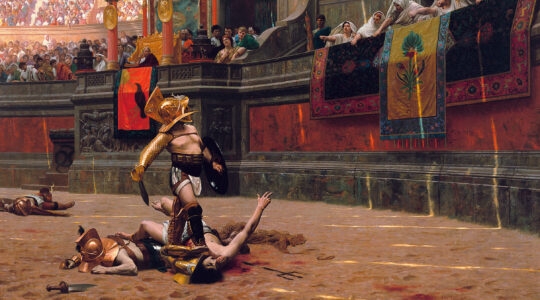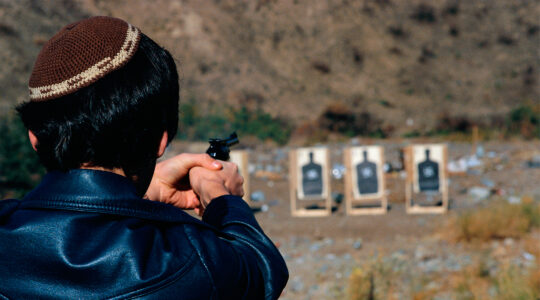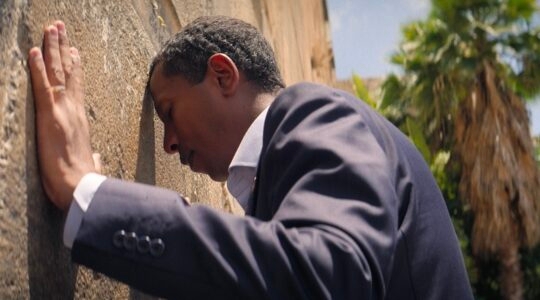
John Safran is nailed to a cross in the Philippines on Easter Sunday, April 10, 2009. (Australian Broadcasting Corporation)
SYDNEY, Australia (JTA) — A Jewish comedian walks into a Palestinian sperm bank and arouses himself on camera with the aid of Barack Obama’s book “The Audacity of Hope.”
No, it’s not a stunt from Sacha Baron Cohen’s latest movie, but a scene from a new Australian TV show inspired by a Jew’s struggle with intermarriage.
John Safran’s “Race Relations,” a controversial new eight-part series that began airing last week, is about interracial love “in the age of Obama.”
The star of the show, Safran, 37, is an award-winning TV comedian and radio host who was born in Melbourne, brought up in a traditional Jewish household and educated at Yeshivah College, an Orthodox Lubavitch-run boys’ school.
His show, which has been denounced by the Australian Family Association as “the lowest point in Australian television history,” includes a scene in which he sniffs underwear he’s stolen from Jewish and non-Jewish women in a “scientific” experiment to determine if he was more attracted to non-Jewish women.
Safran says there is a serious side to his show about intermarriage, especially since, statistically, the chances of marrying someone from one’s own ethnic background are slim.
“Being Jewish, it’s such a potent issue in the community and I can engage with it,” he told JTA in an interview.
Since 1997, when he was filmed streaking through Jerusalem wearing only a scarf, Safran has produced some of the edgiest, raciest and most irreverent material ever screened on Australian TV. His trek to the Ivory Coast to have a voodoo spell cast on an ex-girlfriend and his attempt to join the Ku Klux Klan, among other pranks, have elevated him to an iconoclastic satirist of Australian culture.
Even before the first episode of Safran’s new show aired last week on the Australian Broadcasting Corp., a furor had erupted over Safran’s stunts. An editorial in The Australian newspaper slammed it as “contrived and pointless,” asking why the public broadcaster had used taxpayer money for such a program.
Jewish groups have remained silent thus far.
Safran says the show is about a theme that’s personal: When he had a non-Jewish girlfriend in college, Safran’s parents pressured him to leave her and marry a Jewish woman.
Jewish books on intermarriage influenced the series, he says. Citing one book, Safran says a rabbi argues that “marriages will start off OK but then racism is just inevitably going to get in the way.”
Safran tests the theory by going speed-dating disguised as a black man in Chicago, an idea inspired by the 1961 book “Black Like Me” by John Howard Griffin, who spent several weeks disguised incognito in Mississippi.
“I wanted to see what it was like to experience racism,” said Safran, adding that he was surprised the white racists he met were not embarrassed. “It was confusing and exhilarating. I actually felt like even if I was caught I’d have been fine. It was definitely a very strange experience.”
The pasty-faced, bespectacled Safran even visits the grave of his mother, the daughter of Polish Bundists, armed with a spade and a kabbalah book seeking an answer to this question: “When it comes to love, should you stick with your tribe or escape your tribe?”
He says the idea comes from a book on Jewish exorcisms in Safed.
“If you wanted to know the answer to something you dig a hole next to the grave, lie in it, say kabbalah prayers and then the spirit comes inside of you,” Safran said.
He does just that on his show but does not get the hoped-for answer. So he takes his odyssey to Japan, Togo, Thailand, the Netherlands, Britain and the Middle East.
In Israel, Safran covertly swaps the semen of his Palestinian soundman and deposits it in an Israeli sperm bank while donating his own to a Palestinian fertility clinic in the West Bank to create a “Jewlestinian.”
In the Philippines, Safran is nailed to a giant cross on Easter Sunday.
“Before they crucify you they just flagellate you and whip you,” Safran said. “Apparently I screamed too much and they were threatening not to crucify me because they said you can’t be on the crucifix when you are screaming. So the whole day was a combination of fear of being crucified and fear of not being crucified.”
Afterward, he said, “The pain went away pretty quickly.”
Safran says he draws inspiration from the likes of satirists such as Baron Cohen and Michael Moore.
“They push me further and make sure I don’t get slack,” Safran said.
“I just love ethnic comedy, Chris Rock and Larry David,” he adds. “I watch Michael Moore, Willie Theroux, Morgan Spurlock or Sacha Baron Cohen with my brain chugging at 100 kilometers per hour working out exactly how everything was done.”

Help ensure Jewish news remains accessible to all. Your donation to the Jewish Telegraphic Agency powers the trusted journalism that has connected Jewish communities worldwide for more than 100 years. With your help, JTA can continue to deliver vital news and insights. Donate today.





